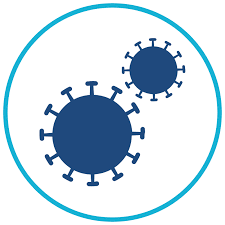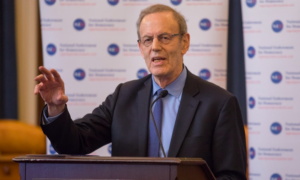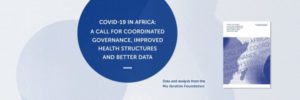As governments adopt extraordinary measures to combat Covid-19, it is vital to ensure democracy does not become the silent victim of the pandemic, some 28 global leaders caution in an open letter today.
“While governments everywhere struggle to contain the Covid-19 pandemic and do all they can to protect public health, democracy is at risk in many places around the world. Hard-won rights are being swept aside by emergency measures, elections postponed indefinitely, or held under problematic conditions, and essential freedoms eroded,” the letter states:
Since the beginning of March, the International Institute for Democracy and Electoral Assistance (IDEA) has noted that more than 50 countries and territories have postponed elections because of the crisis. Though ostensibly legitimate in the midst of a pandemic, some countries have put off their elections using health emergency laws, instead of through appropriate political channels as stipulated by their constitutions and international standards, and without agreeing to a consensual process for fixing a new date. In the same period, nineteen countries and territories have gone ahead with their elections in difficult circumstances, some of which could undermine their democratic integrity, if not their legality.
![]() The letter’s signatories include former heads of state, diplomats, advocates, and leading experts including former U.S Secretary of State Madeleine K. Albright (above); Laura Chinchilla, former President of Costa Rica; Dr. Goodluck Jonathan, former President of Nigeria; and Doris Leuthard, former President of Switzerland, as well as associates of the National Endowment for Democracy (NED).
The letter’s signatories include former heads of state, diplomats, advocates, and leading experts including former U.S Secretary of State Madeleine K. Albright (above); Laura Chinchilla, former President of Costa Rica; Dr. Goodluck Jonathan, former President of Nigeria; and Doris Leuthard, former President of Switzerland, as well as associates of the National Endowment for Democracy (NED).
The letter outlines several measures that democracies should take to protest democratic rights and ensure electoral integrity. It recommends striking a balance between legitimate public health concerns and democratic rights by following seven principles:
- A firm grounding in the law. The adoption of emergency measures, including changes to elections, should conform to constitutional provisions and electoral laws. Where the national legal framework does not anticipate such a situation, necessary changes should be formally adopted, consistent with international obligations.
- Broad political support. Even where the law is clear, a consultative approach building agreement across the political landscape is crucial. Without this, measures may be perceived as a strategy for political gain by incumbents, which can subvert the public trust that is essential to address the health crisis.
- Clear and transparent communication to the public. Citizens will need to understand what measures are being considered, by whom, and on what grounds. The media and civil society have a crucial role to play in preventing democratic erosion by monitoring policy, fostering or enabling debate, and shining a light on critical issues.
- Any measures taken – from adjustments at the polling station to more profound changes in how voters are registered, ballots are cast, or votes are tabulated – should be reasonable and proportionate to the risk posed by the coronavirus.
- Based on the best available technical information. Choosing suitable, proportionate measures requires not only legal certainty and political buy-in but also subject matter expertise. The relevant experts, including electoral experts, should be consulted as early as possible.
- Time-bound. The horizon for any emergency measures should be clearly set out. This is particularly relevant in the case of a postponement of elections, which should not be open-ended. Where it is not possible to set a new date, there should be clarity and agreement on how to determine when risks have been overcome.
- Mindful of particularly affected groups. Some citizens will require special consideration at this time to ensure free, fair, and safe elections. These include those who are in hospitals or isolation due to the virus; health care workers; law enforcement and military personnel assisting in the crisis; and traditionally marginalized groups, such as women, persons with disabilities, the elderly, refugees and migrants, minority groups, and others who might otherwise be disenfranchised.

ICNL
Many governments are implementing emergency decrees which permeate legal structures and become normalized, said Douglas Rutzen, the president of the International Center for Not-for-Profit Law in Washington, which is tracking new legislation and decrees during the pandemic via its COVID19 global tracker (above).
“It’s really easy to construct emergency powers,” he said. “It’s really difficult to deconstruct them.”
A bipartisan group of U.S. lawmakers recently introduced the Protecting Human Rights During Pandemic Act, legislation requiring the State Department and United States Agency for International Development (USAID) to take steps prevent human rights abuses from being implemented and legitimized in the name of the coronavirus response:
The Protecting Human Rights During Pandemic Act makes clear that, as a lead drafter of the Universal Declaration of Human Rights with a long history of global leadership, the United States should encourage the protection of internationally recognized human rights during the Coronavirus response, both in its own policies at home, and through diplomacy and development assistance abroad.
Democracy assistance groups are also taking steps to protect civil society partners during the pandemic.
 “At this time of unprecedented crisis caused by the Covid-19 pandemic – including medical emergencies, social isolation, economic recession, and rising autocratic assertiveness – the NED wants to assure all of its grantees, partners, and friends that it is open, working, and adapting to the new challenges we face,” said Carl Gershman, (left), president of the National Endowment for Democracy (NED). The endowment “fully understands the tremendous human, social, economic, and political costs of this terrible new period,” he added, promising “undiminished solidarity.”
“At this time of unprecedented crisis caused by the Covid-19 pandemic – including medical emergencies, social isolation, economic recession, and rising autocratic assertiveness – the NED wants to assure all of its grantees, partners, and friends that it is open, working, and adapting to the new challenges we face,” said Carl Gershman, (left), president of the National Endowment for Democracy (NED). The endowment “fully understands the tremendous human, social, economic, and political costs of this terrible new period,” he added, promising “undiminished solidarity.”
Democracies in Central and Eastern Europe have been in retreat for a while even before being hit by the pandemic. This is why the possible consequences of this extraordinary moment are so alarming, adds Simona Merkinaite, Program Coordinator at the Open Lithuania Foundation.
For post-totalitarian societies, still learning the art of politics through building trust and ties, rather than through manipulation and arbitrariness of state powers, isolation presents a specific democratic challenge, she writes for Visegrad Insight as a contribution to the #DemocraCE project.
 COVID-DEM’s ‘super-blog’ curates analysis of COVID-19’s impact on democracy worldwide from almost 40 blogs worldwide.
COVID-DEM’s ‘super-blog’ curates analysis of COVID-19’s impact on democracy worldwide from almost 40 blogs worldwide.
*The letter is signed by:
- ALBRIGHT, Madeleine K. – Former U.S Secretary of State; Chair of the National Democratic Institute (NDI); Member of the Kofi Annan Elections Integrity Panel of Senior Figures.
- ANNAN, Nane – Member of the Kofi Annan Foundation Board.
- BANBURY, Anthony – President and Chief Executive Officer of the International Foundation for Electoral Systems (IFES); Member of the Kofi Annan Elections Integrity Core Group.
- CARTER, Jason J. – Chair of The Carter Center Board of Trustees.
- CHINCHILLA, Laura – Vice-President of the Club of Madrid; Former President Costa Rica; Chair of the Kofi Annan Commission on Elections and Democracy in the Digital Age; Member of the Kofi Annan Elections Integrity Panel of Senior Figures.
- CLARK, Joe – Former Prime Minister of Canada; Member of the Kofi Annan Elections Integrity Panel of Senior Figures.
- DOSS, Alan – President of the Kofi Annan Foundation.
- DREIFUSS, Ruth – Former President of the Swiss Confederation and Federal Councillor; Member of the Kofi Annan Elections Integrity Panel of Senior Figures.
- GASPARD, Patrick – President of the Open Society Foundation (OSF).
- HEYZER, Noeleen – Former Executive Secretary of the United Nations Economic and Social Commission for Asia and the Pacific (ESCAP); Member of the Kofi Annan Commission on Elections and Democracy in the Digital Age.
 IBRAHIM, Mo – Founder of the Mo Ibrahim Foundation (right).
IBRAHIM, Mo – Founder of the Mo Ibrahim Foundation (right).- ILVES, Toomas Hendrik – Former President of Estonia; Member of the Kofi Annan Commission on Elections and Democracy in the Digital Age.
- JONATHAN, Goodluck – Former President of Nigeria; Chair of the Goodluck Jonathan Foundation; Member of the Kofi Annan Elections Integrity Panel of Senior Figures.
- KOENDERS, Bert – Former Foreign Minister of the Netherlands; Member of the Kofi Annan Elections Integrity Panel of Senior Figures.
- LETERME, Yves – Former Secretary-General of International IDEA; Former Prime Minister of Belgium; Member of the Kofi Annan Commission on Elections and Democracy in the Digital Age.
- LEUTHARD, Doris – Former President of the Swiss Confederation; Former member of the Swiss Federal Council; Member of the Kofi Annan Foundation Board.
- MACHEL, Graça – Minister for Education and Culture of Mozambique; Former First Lady of Mozambique and South Africa; Member of the Kofi Annan Foundation Board.
- MALCORRA, Susana – Former Foreign Minister of Argentina; Former United Nations Under- Secretary-General for Field Support; Former chief operating officer and Deputy Executive Director of the World Food Programme; Member of the Kofi Annan Foundation Board.
- MITCHELL, Derek (Amb.)* – President of the National Democratic Institute (NDI).
- MOLLER, Michael – Former Under-Secretary-General of the United Nations and the 12th Director-General of the United Nations Office at Geneva; Member of the Kofi Annan Foundation Board.
- PETERS, Mary Ann Amb. (ret.) – Chief Executive Officer of The Carter Center.
- SALAMÉ, Ghassan – Former UN Special Envoy for Libya; Member of the Kofi Annan Foundation Board.
- STEDMAN, Stephen – Secretary-General of the Kofi Annan Commission on Elections and Democracy in the Digital Age.
- SY, Elhadj As – Chair of the Kofi Annan Foundation Board; Co-Chair of The Global Preparedness Monitoring Board (GPMB); Former Secretary-General of the International Federation of Red Cross and Red Crescent Societies (IFRC).
- WIECZOREK-ZEUL, Heidemarie – Former Minister for Economic Cooperation and Development of Germany; Member of the Kofi Annan Elections Integrity Panel of Senior Figures.
-

will.i.am
will.i.am – Musician and entrepreneur; Member of the Kofi Annan Foundation Board.
- YUDHOYONO, Susilo Bambang – Sixth President of the Republic of Indonesia; Member of the Kofi Annan Elections Integrity Panel of Senior Figures.
- ZEDILLO, Ernesto – Former President of Mexico; Member of the Kofi Annan Elections Integrity Panel of Senior Figures; Member of the Kofi Annan Commission on Elections and Democracy in the Digital Age.
*Ambassador Mitchell highlights an eloquent argument from NDI Chairman Madeleine Albright in The Economist about why democracies must wake up to the threat posed by authoritarian opportunists using #COVID19 as an excuse to erode democracy.
![]()







